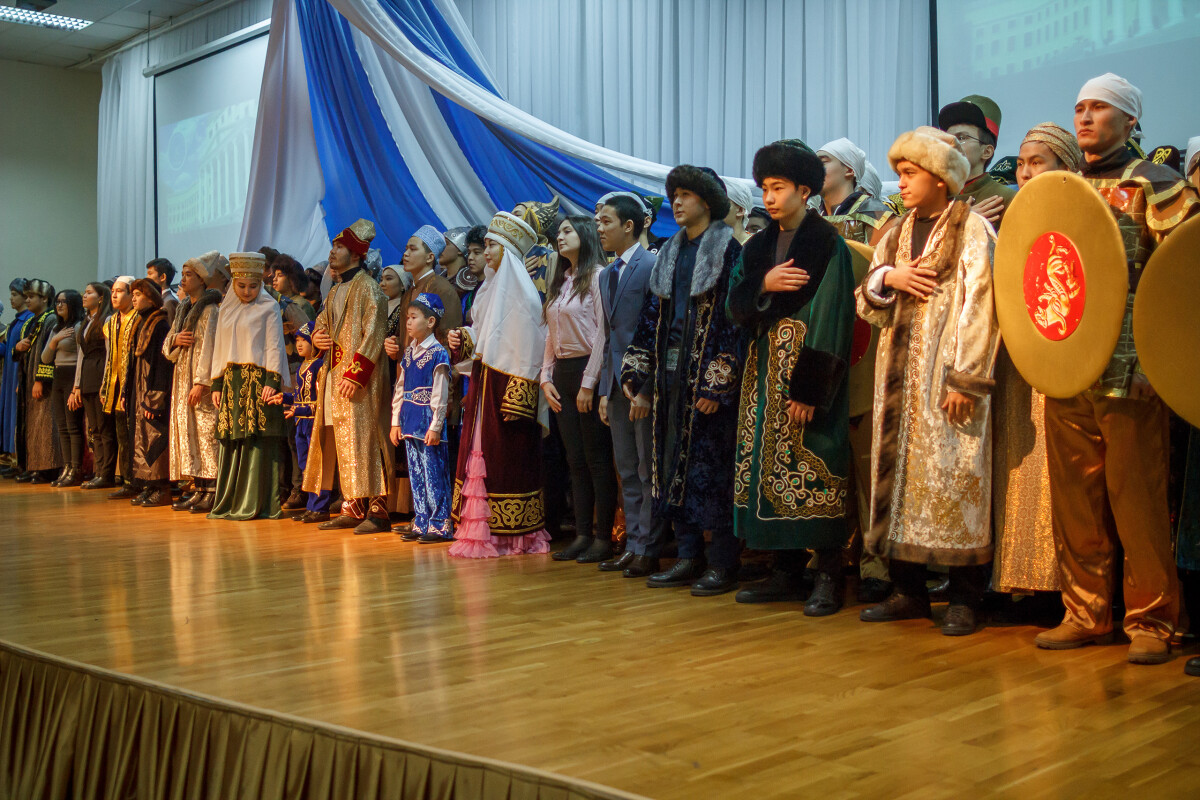
During the Soviet time, historians of the Bolshevik revolution labeled the rebellion as a patriarcho-feudal one. The Kazakh historian Yermukhan Bekmahanov tried to provide a more objective analysis of this movement but going against communist ideology, at that time, was considered to be a crime, and therefore he was accused of engaging in “bourgeois ultranationalism”, stripped of all his awards, academic degrees, titles and on December 4th, 1951 sentenced to 25 years under article 58-10 of Criminal code of Russian SFSR.
Representatives of the NDH portal attended the student theater play “Songy khan” that was performed at the KAZGUU university, organized within the framework of the program “Ruhani Zhangyru” and were glad to see that students are learning about national history not just through theoretical means but also by using creative methods.
.jpg)
The performance of the student actors was supported by an unprecedented full-house. The play portrayed the figure of Kenesary Khan as the leader of a national liberation movement of 1837-1847 against the czar-led colonization of the territory. The young actors managed to recreate the epoch of their ancestors who sacrificed their life for their peoples’ future independence, and with a talented performance, revived the memories of their achievements in the hearts of the audience. It must be noted that they managed to not just recreate the historical imagery but also demonstrate Kazakh traditions and customs.
The attache of the Embassy of Iran, Mehdi Esfandiari, was invited as the honorary guest. Students of KAZGUU, Gumilev ENU, “Nur Orda” Lyceum and “Bilim Innovatsiya” Lyceum had an opportunity to enjoy the theatrical performance as well.
.jpg)
The professor of the School of General Disciplines under KAZGUU University, Lepuda Mukatayev told us about how the idea for the play was born.
- Everything started with a reflection on the studied historico-theoretical material which was then presented in the form of a theater play. First, the students study the theoretical material and then go on historical excursions to Ulytau. Students from previous years went on trips to Turkestan, Tamgaly, Bayanaul, Koshetau, Charyn and Taras, to get to know medieval legends, mosques and mausoleums. There they were inspired by the spirit and atmosphere of the environment.
.jpg)
For a long time we could not get a team for the trip to Ulytau, until professors started to call upon the students themselves. During the trip to Ulytau it was interesting to observe the change in the engagement of the young people. The first day they made selfies, posing in front of the mausoleum. On the second day, they started to reflect more about the site. And on the third day they started interrogating the excursion guides with questions such as “Why is this like this, and how come”. On the fourth day, when it was time to leave the Ulytau, they asked why so little time was allocated for the trip, realizing that this was the bedrock and heart of the Kazakh people.
- Did this realization come gradually?
- Yes, and they experienced that. Upon return to Astana, they started working on the theater play and today is the culminating moment of all this. After the trip to Ulytau they said “I now understand what we were studying in school and university. I understand the decisions of Kenesary Khan”.
.jpg)
After our proposal to make a theater play, they commenced working on it with great enthusiasm. There was a casting and some students were upset to not have gotten the roles they wanted.
- How were we able to organize such an epic play?
- Only by working together. When during the rehearsals the students would sometimes lose their enthusiasm we would remind them that they are also part of history. And this really sunk in and they changed their attitude. After the trip to Ulytau the students wrote an essay. In one of them a young man wrote: “At the mountain Terekty-Auliye I swore that when my children grown up I would take them him and tell them about the history of this place personally”. The young student Asel wrote: “How could I have lived so far, without finding out about our history personally? I am so grateful to the university for the organization of this trip”.
.jpg)
- You are not just history professors but also theater playwrites?
- All the history professors combined their efforts. Somewhere the students added their ideas, made decisions on the stage props, handmade some things. If you look here, the Khan will be raised on this white felt blanket. However, everything is put together by Izatkhan Belkhodzhayeva, who was in the role of the play director.
Izatkhan Belkhodzhayev is the director of the KAZGUU museum.
It was three years ago when we first put on the play about Kenesary. This year 112 students took part in the play and 55 of them played the main roles. Zhanybek Rysbai played the main role of sultan Kenesary.
.jpg)
The director of the School of General Disciplines, Rakhymbek Zholayev gave a praise-worthy assessment to the creative efforts of the students.
Our students are the most talented and brave. They were preparing for 2-3 months, rehearsed until 12 at night. We all know that by the initiative of the Head of State a program is being realized in the country, “Ruhani Zhangyru” and our today’s event is part of the general plan of revival of the historical past. We opened a center of history of Kazakh and Rukhani Zhangyru where we prepared our own concept for the studying of Kazakhstan’s history. First the students learn the background historical and theoretical material and then we show them the historical places where certain events in history took place and as a result of that, they prepare the play. Our main goal is to teach the young generation about our history so that they could be proud of it.
.JPG)
